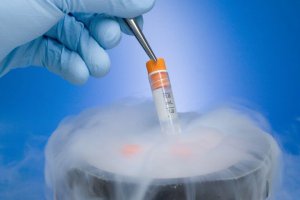Prenatal DNA testing includes mainly two tests: Amniocentesis and CVS. These tests are very helpful to find genetic diseases before the birth of your baby. It is good that you go for these tests in advance as if there is any abnormality then it can be treated on time. Parents can know about genetic diseases or chromosomal problems before birth which helps them in making good decisions for the health of their baby. Both tests Amniocentesis and CVS are briefly described below:
How Amniocentesis is done:
This test involves the removal of amniotic fluid from the uterus. In this case, a doctor inserts a needle through the abdomen into the uterus and then a doctor withdraws some fluid which is sent to the laboratory for evaluation, from this, doctors diagnose genetic diseases, infections, or signs of lung development.
How CVS is done:
In CVS, doctors remove a small portion of placenta tissue from the uterus. This sample is then sent to the laboratory for further testing. It involves two steps:
- A thin tube is inserted into the vagina to get placenta tissue. The doctor uses ultrasound images to guide the catheter to the spot.
- In another way, a needle is inserted through the abdomen and then this needle takes placenta tissue from the uterus. As the same as the previous step, ultrasound is used to guide the needle.
Invasive prenatal tests Fort Worth, TX professionals can help you in getting prenatal tests such as Amniocentesis and CVS in your budget. For any emergency, make an appointment as early as possible.
Which technique is used to collect fetal cells during pregnancy for genetic testing?
The two primary methods for obtaining embryonic cells for prenatal DNA testing or fetal genetic testing are chorionic villus sampling (CVS) and amniocentesis. A small quantity of amniotic fluid, which includes embryonic cells, is removed during an amniocentesis procedure by passing a fine needle from the abdomen and into the amniotic sac enclosing the fetus. Bypassing a small hollow tube through the birth canal or a needle through the abdomen, CVS obtains a placenta sample. Using these techniques, medical professionals may examine the fetal cells for genetic disorders and chromosomal anomalies.
How accurate is fetal genetic testing?
When using amniocentesis or CVS for fetal genetic testing, severe chromosomal mutations such as Down syndrome and neural tube defects may be detected with over 99% accuracy. It can be more difficult to definitively detect more uncommon hereditary illnesses. Although there is little possibility of both false positive and false negative outcomes, the accuracy is good.
What does fetal fraction mean on genetic testing?
The percentage that consists of DNA results without cell examination derived from the developing baby in the blood of an expectant mother is known as the fetal fraction. Tests for prenatal genetic screening, including cell-free DNA testing, perform better when the fetal fraction is larger. Inaccurate test findings are associated with fetal fractions less than 4%. High maternal weight is one factor that can reduce the fetal fraction.
What diseases can be detected through genetic testing during pregnancy?
Dozens of hereditary genetic illnesses, including as
Down syndrome:
A person with Down syndrome is genetically predisposed to having an extra copy of chromosome 21 at birth. This indicates that, as opposed to 46, they have 47 chromosomes in total. Their physical and brain development may be impacted by this. With supportive care, people with Down syndrome have happy, healthy lives.
Tay-Sachs disease
A rare genetic condition called Tay-Sachs disease is inherited from parents to children. It results from the lack of an enzyme that aids in the breakdown of fatty materials. These fat molecules, known as gangliosides, accumulate to hazardous concentrations in the brain and spinal cord, impairing nerve cell function.
sickle cell anemia
Normally, red blood cells are flexible and spherical. Some red blood cells in sickle cell anemia resemble wheat shears. The illness gets its name because of these odd shapes.
cystic fibrosis
A hereditary disorder called cystic fibrosis results in an accumulation of sticky mucus in the digestive tract and lungs. Lung infections and issues with food digestion result from this.
All of these can be detected with “genetic testing during pregnancy” using amniocentesis or CVS. It’s also occasionally possible to find certain structural disorders including birth abnormalities and neural tube problems.
Is Fetal Alcohol Syndrome Genetic?
A set of illnesses known as fetal alcohol spectrum disorders, or FASDs, can affect someone who was exposed to alcohol before birth. These consequences may manifest as behavioral and learning issues in addition to physical ailments. FASD sufferers frequently have a combination of these issues. Nonetheless, to the best of our knowledge, FASD’s heritability does not follow this pattern, leading to the conclusion that FASD is highly heritable but more impacted by environmental variables in many areas that fall within the spectrum of the disorder.
Choose Clarity with Our DNA Test.
Get Accurate Answers With our Test!.
-
- Accurate
- Quick Result
- Private and Secure
- Affordable

Conclusion
Doctors can examine fetal cells for a range of chromosomal and genetic problems throughout pregnancy with procedures including amniocentesis and CVS. This cutting-edge fetal genetic testing gives parents and medical professionals important knowledge to help them plan for the baby’s medical needs. Even while not all conditions can be tested for, there are several that can assist families in making decisions about the baby’s healthcare before the infant is born. When pregnant, speak with a doctor about the best alternatives for screening and testing based on your medical history.







Leave a Reply
Your email is safe with us.
You must be logged in to post a comment.